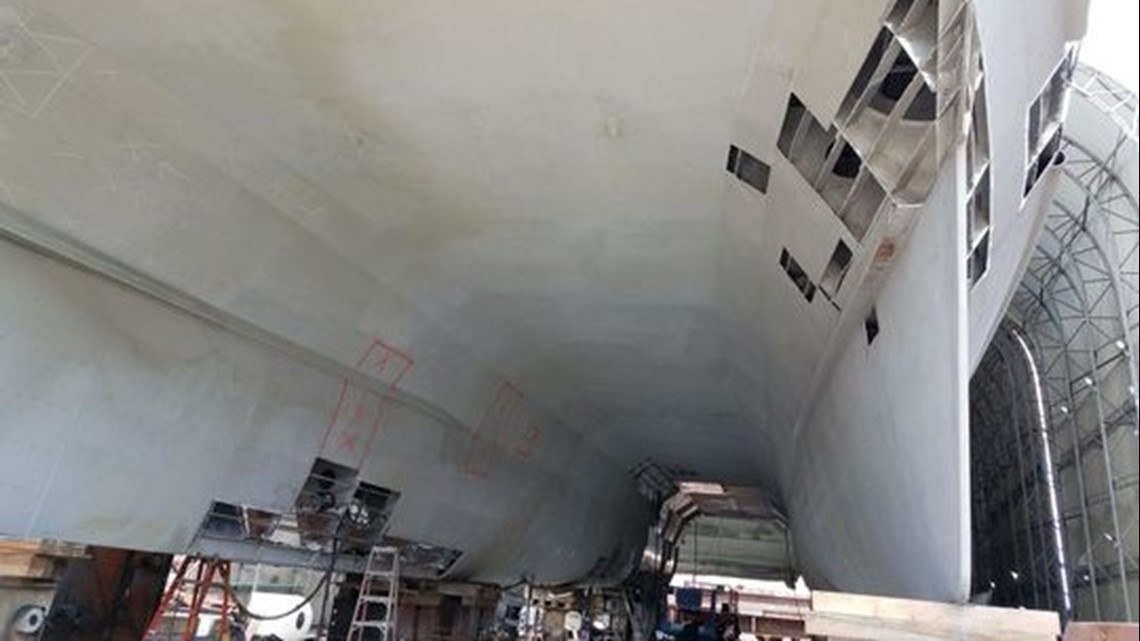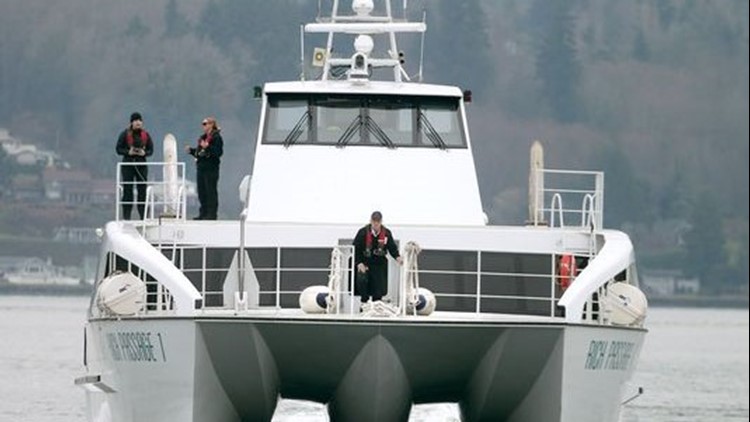Tuesday marked the one-year anniversary of the launch of passenger-only fast ferry service from Bremerton to Seattle. As Kitsap Transit prepares to expand service to the north end of the county later this year, here are five things to keep an eye on in the coming year.
1. Kingston service begins
Kitsap Transit hopes to start service from Kingston sometime in 2018. In its business plan, the agency targeted mid-2018 as a start date, but the rollout has been pushed back because of delays with refurbishing the vessel that will run the route, the M/V Finest.
The Finest, a 22-year-old, 350-passenger vessel from New York, is undergoing renovations at a Nichols Brothers Shipyard on Whidbey Island. It’s expected to be delivered to Kitsap Transit in late September, according to Kitsap Transit executive director John Clauson.
Several pieces have to come together before Kitsap Transit can launch the Kingston route. Contractors hired by the Port of Kingston still need to complete renovations to the pier and float where the Finest will dock. The Melissa Ann, a backup boat leased from Four Season Marine, will also be delivered in September.
Kitsap Transit is in the process of hiring crew members and plans to train them on the Melissa Ann until the Finest is ready for sea trials. Sea trials will take 30 days.
“The reason that we haven't picked a (start) date yet is because we have a lot of moving parts,” Clauson said.
Kitsap Transit said the service will use a schedule similar to Bremerton when it started: six round trips a day. Tickets prices will be the same.
2. Building out the fleet
The fast ferry operation figures to change substantially in the next year, as Kitsap continues to build out its fleet. First up is two additional high-speed, low-wake catamarans for the Bremerton route.
Kitsap Transit’s board of commissioners approved the purchase of the two additional “Rich Passage-class” vessels in February. RP2 and RP3, as they’re being called for now, are under construction at Bellingham-based shipbuilder All-American Marine.
Both boats should come online in early 2019. The deadline for delivery of the first vessel is January 15, and April 15 for the second. The total cost for both RPs is just over $15 million.
The addition of two boats figures to change the dynamic of the Bremerton run by potentially allowing Kitsap Transit to add runs. Having a backup also allows for Kitsap Transit to continue service in the event of a breakdown instead of pointing riders toward the state ferry.
Work on several bow-loading vessels, which will be used on the Kingston and Southworth routes, will also get started this year. Kitsap Transit is opening a request for proposals this month for two to three custom high-speed ferries.
Five shipyards from around the country will be submitting proposals. The bow-loaders will have a capacity of 200-250 riders and need to be able to use the car ferry slips at WSF docks.
Once a shipyard has been awarded the contract, construction of the boats could take 12 to 18 months, Clauson said.
Funds for all of Kitsap Transit’s vessels come from $45 million in general obligation bonds issued last summer. The agency has earmarked about $18 million for two bow-loaders, with an option for a third that would serve as a backup.
Once the bow loaders are in service, the Finest will serve as a backup on the Kingston route.


3. Fixing the reservation system
Kitsap Transit will continue to address complaints about its reservation system for the Bremerton-Seattle route. Put in place at the start of service, the system allows riders to book 88 of the Rich Passage 1’s 118 seats. Thirty seats are held for walk-ons.
Riders have complained that reservation that is slow, buggy, unintuitive and open to abuse. Kitsap Transit renewed the contract of the system’s vendor, RocketRez, in April while it looks to address the problem long-term.
To that end, Kitsap Transit’s board of commissioners approved hiring a consultant to take a look at the current system. The consultant, Four Nines Technologies out of San Francisco, will be tasked with reviewing the current reservation system’s challenges and searching for an alternative that fits the fast ferry service best. The scope of work includes an analysis of how well each system would handle both frequent and casual users, special events and multiple locations.
The firm may also recommend Kitsap Transit build its own system or modify another vendor’s software.
Kitsap Transit likely won’t use the reservation system for Kingston when service begins, according to Clauson. However, he said the agency wants to be able to “turn on” a reservation system for Kingston for specific sailings if necessary.
4. Dock space in Seattle
Right now, Kitsap Transit docks at a Washington State Ferries-owned pier to the north of Colman Dock. That slip can only accommodate only two vessels at a time, and Kitsap Transit currently shares it with King County’s Water Taxi service to West Seattle.
The addition of Southworth service in 2020 will bring the total to five routes all trying to dock in Seattle at similar times.
Other communities in the Puget Sound region have brought up the idea of using ferries to bypass traffic on Interstate 5, and many have their eyes on what Kitsap Transit is doing with its fast ferry service. In October, the Tacoma City Council passed a resolution to study the possibility of bringing fast ferry service to the south sound.
With more municipalities looking to skip traffic and connect to Seattle via water, solving the docking problem in Seattle has become a priority.
“That’s something we as a region need to sit down and figure out,” Clauson said.
“We’ve all discovered that the marine highway out here is inexpensive right of way, and it's a wonderful way to provide additional capacity that doesn't require asphalt.”
Right now, it’s just conversation. Transportation officials from around the region met at a fast ferry summit last month to discuss the docking and other issues related to fast ferries. Another meetup is planned for October, and Kitsap Transit plans to ask the organizers to make docking a primary topic of discussion, according to marine services director Darrell Bryan.
5. An agreement with King County
Kitsap Transit’s original fast ferry business plan recommended reaching an agreement with King County Marine to operate and maintain the vessels. But so far, no deal has materialized.
The two sides are still talking, but transit officials say it’s unlikely anything gets done this year. For now, the holdup is an administrative one. The King County Council has started its budget process, which usually lasts until Thanksgiving, Clauson said.
“They’re pretty much booked out. We just knew there was no way in the world that we were going to get an agreement put together and handed to them in time for them to go through their deliberative process,” Clauson said.
In the meantime, Kitsap Transit is hiring its own crews to operate the Kingston ferry. Recent talks have included discussions about how King County would assume Kitsap employees were it to take over running the service.
“We made a commitment to the community, we're going to start the Kingston service, so in the meantime, we're recruiting and we're going to be hiring and training,” Clauson said.
The two agencies have already worked out one agreement — Kitsap Transit leased King County’s backup boat to run the Bremerton route in March while the Rich Passage 1 underwent repairs.



